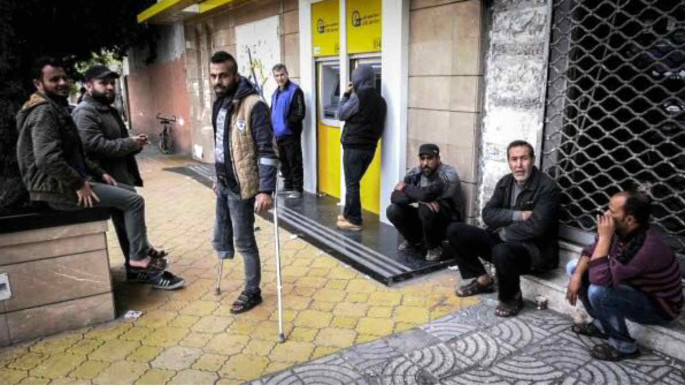Cutting our salaries is a crime, Gaza PA employees say
Ahmed Kahlout is one of approximately 55,000 Gaza-based employees of the West Bank-based Palestinian Authority who did not receive their pay this month.
"I've become a beggar. The supermarket, the baker and the grocery need money from me, and I haven't been able to pay them for days now," he lamented. "I have no other source of income. I will die along with my six kids without any way to support my family."
When, in 2007, Hamas routed Fatah from the Gaza Strip in internecine fighting a year after the Islamist movement's victory in elections, the Fatah-dominated PA ordered its employees to stay home rather than work for the new government.
But to retain their loyalty, it continued to pay their salaries. At least, until recently.
In April 2017, the PA cut their salaries by 30 percent as it began ratcheting up a campaign to stir unrest against its rival Hamas. And this month, they didn't receive their pay at all. Payments were only received by retired military personnel.
On March 19, Abbas announced he would take legal and financial measures to further tighten the screws against the population of the Gaza Strip as a way of forcing Hamas to give up control of the coastal enclave, but Egyptian authorities reportedly stopped him from declaring it a renegade territory.
Abbas claims the lack of payment this month was due to "technical problems". Still, speculation among disenfranchised PA employees is that Abbas is trying to strangle the population to punish Hamas.
"Salaries were paid into banks in the West Bank - but not in Gaza," said Arif Abu Jarad, head of the union representing PA employees in the Gaza Strip. "There is a state of anger among staff in the Strip."
Will the salaries be restored? And if not, why would PA President Mahmoud Abbas destroy the loyalty of his - until now - dedicated employees?
"We have families and we buy goods," speculated Gaza PA employee Abdul Majeed Watfa. "If we can't buy food and clothes, the economy is hurt and ultimately that hurts the Hamas government. It also produces a lot more angry people."
Sumaya Majed, another PA employee, agreed. "Abbas is trying to put pressure on Hamas, so it will hand over the Strip. But he's not really punishing Hamas; we're the ones who are punished."
 |
The PA employees in Gaza now are as angry at Abbas as they are at Hamas |  |
If cultivating a backlash against Hamas is indeed Abbas' goal, it's not achieving the desired effect. The PA employees in Gaza now are as angry at Abbas as they are at Hamas.
"Why would the president cut our wages when we are the only ones supporting him in Gaza? He shouldn't touch our salaries because they are our rights," stormed PA employee Mohammed Abu Namous.
"The big ass is punishing us because of the failure to reach an agreement with the terrorist Hamas," said Mohamed Hassan, bluntly. He is a longtime PA employee who was born in Lebanon but moved to Gaza just after the signing of the Oslo Accords, for what he thought would be a more peaceful period.
"I ran out of food, gas and money over two weeks ago and I have five children to feed. Abbas and Hamas are both destroying our life."
Jamal El-Khodary, head of the Popular Committee against the Siege and a member of the Palestinian Legislative Council, called the salary cuts illegal. "Differentiating between PA employees based on residency or loyalty is dangerous. It's discrimination and tears apart the social fabric," he warned.
The non-payment of salaries is just the latest in a series of sanctions imposed by the PA since last summer, including reducing financing for electricity supplied by Israel to Gaza and reducing the number of exit permits for residents needing medical treatment in Israel or the West Bank.
There still are a few PA employees who support Abbas because they say drastic actions are needed to topple Hamas - even if it hurts the people too.
Mona Elyan insisted Abbas should have taken these steps years ago. "They will solve the whole Palestinian-Palestinian division," she said. "Gaza needs a big change, and I believe cutting salaries is such a big change that will put an end to every problem in the Strip."
But Elyan is unusual. Once their own salaries were cut, most PA employees no longer supported Abbas. In fact, a group of PA employees gathered for a protest recently in Gaza City's Al-Nasser Street, closing it down. Mohammed Saa'd, also a PA employee, said cutting salaries altogether would destroy his life completely, since he supports three children in university and others in secondary school.
 |
My son and two daughters in university will surely be forced to stay at home if I don't get my salary next month |  |
"My son and two daughters in university will surely be forced to stay at home if I don't get my salary next month. Their future depends on my salary. I have no one to complain but to God," Saa'd said, angrily.
Sumaya Khalil, who waited in vain at the Palestine Bank in hopes of receiving her salary, agreed, saying a total cut of her pay would be the "end of my damned life".
"Cutting it by a third already meant I didn't have enough for me and my family."
Mohammed Arafat is a Gaza-based writer with We Are Not Numbers.
Follow him on Twitter @moharafat92.




![President Pezeshkian has denounced Israel's attacks on Lebanon [Getty]](/sites/default/files/styles/image_684x385/public/2173482924.jpeg?h=a5f2f23a&itok=q3evVtko)



 Follow the Middle East's top stories in English at The New Arab on Google News
Follow the Middle East's top stories in English at The New Arab on Google News


